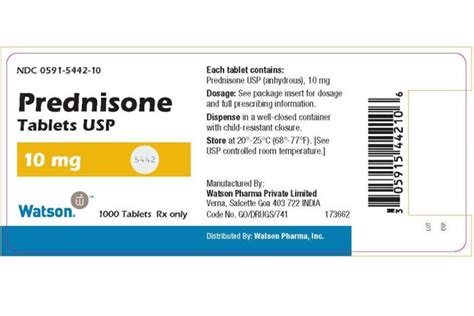Intro
Taking prednisone, a corticosteroid medication, can have a significant impact on various bodily functions, and its timing can influence its effectiveness and side effects. Prednisone is commonly prescribed to treat a range of conditions, including asthma, arthritis, and autoimmune diseases. Understanding the best time to take prednisone can help individuals maximize its benefits while minimizing potential drawbacks.
The importance of timing when taking prednisone lies in its mechanism of action and how it interacts with the body's natural cortisol production. Cortisol, a hormone produced by the adrenal gland, plays a crucial role in regulating metabolism, reducing inflammation, and aiding in the response to stress. Prednisone mimics the effects of cortisol, which can lead to changes in blood sugar levels, blood pressure, and other physiological processes. By taking prednisone at the right time, individuals can better manage these effects and improve their overall treatment outcome.
The daily rhythm of the body, influenced by the circadian cycle, also plays a role in how prednisone is metabolized and its impact on bodily functions. The body's natural production of cortisol typically follows a circadian pattern, peaking in the early morning and decreasing at night. This natural fluctuation can affect how the body responds to prednisone, suggesting that the timing of its administration could be optimized to work in harmony with the body's internal clock.
Understanding Prednisone and Its Effects

Prednisone is a synthetic corticosteroid that is used for its potent anti-inflammatory and immunosuppressive properties. It works by mimicking the effects of cortisol, which helps to reduce inflammation and suppress the immune system. This can be beneficial in treating conditions where inflammation and immune responses are harmful, such as in autoimmune diseases and severe allergic reactions. However, because prednisone affects the body's natural cortisol production, its use must be carefully managed to avoid disrupting the body's delicate hormonal balance.
Benefits and Side Effects of Prednisone
The benefits of prednisone include its ability to rapidly reduce inflammation and suppress the immune system, making it an effective treatment for a range of conditions. However, its use can also be associated with several side effects, particularly when taken in high doses or over extended periods. Common side effects include weight gain, mood changes, insomnia, and increased blood sugar levels. Understanding these effects and how they can be managed is crucial for individuals taking prednisone.Timing of Prednisone Intake

The timing of prednisone intake can significantly impact its effectiveness and the management of its side effects. Generally, prednisone is taken in the morning, as this helps to minimize disruptions to the body's natural cortisol production. Taking prednisone in the morning also aligns with the body's natural circadian rhythm, which can help in reducing the risk of side effects such as insomnia.
For individuals with conditions like asthma, taking prednisone in the morning can help control symptoms throughout the day. Similarly, for those with rheumatoid arthritis, morning dosing can help manage joint pain and inflammation, making it easier to perform daily activities.
Factors Influencing the Best Time to Take Prednisone
Several factors can influence the best time to take prednisone, including the specific condition being treated, the dose and duration of treatment, and individual factors such as lifestyle and daily routines. For example, individuals who experience morning stiffness due to arthritis may find that taking prednisone as soon as they wake up helps alleviate symptoms more effectively.Managing Side Effects and Interactions

Managing side effects and potential interactions with other medications is crucial when taking prednisone. This includes monitoring blood sugar levels, especially for individuals with diabetes, and managing weight gain through diet and exercise. It's also important to be aware of potential interactions with other medications, such as blood thinners, and to discuss any concerns with a healthcare provider.
Practical Tips for Taking Prednisone
Here are some practical tips for taking prednisone: - Take prednisone with food to reduce stomach upset. - Monitor and manage side effects under the guidance of a healthcare provider. - Maintain a healthy lifestyle, including a balanced diet and regular exercise, to mitigate side effects. - Keep track of medication schedules and follow the prescribed dosing regimen closely.Conclusion and Future Directions

In conclusion, the timing of prednisone intake can have a significant impact on its effectiveness and the management of its side effects. By understanding how prednisone works and how its timing can be optimized, individuals can better manage their treatment and improve their quality of life. Future research directions may include exploring personalized treatment regimens that take into account individual factors such as lifestyle and genetic predispositions, as well as developing new corticosteroids with reduced side effect profiles.
Final Thoughts on Prednisone Use
As with any medication, it's essential to follow the prescribed regimen and to discuss any concerns or questions with a healthcare provider. By doing so, individuals can ensure they are getting the most out of their treatment while minimizing potential risks.What is the best time to take prednisone?
+The best time to take prednisone is usually in the morning, as this helps to minimize disruptions to the body's natural cortisol production and aligns with the body's natural circadian rhythm.
How does prednisone affect blood sugar levels?
+Prednisone can cause an increase in blood sugar levels, which is particularly concerning for individuals with diabetes. Monitoring blood sugar levels and adjusting diabetes management plans as needed is crucial.
Can I stop taking prednisone suddenly?
+No, it's not recommended to stop taking prednisone suddenly. This can lead to a rebound effect, where the body's natural cortisol production is suppressed, potentially causing serious health issues. Always consult with a healthcare provider before changing or stopping prednisone treatment.
If you have found this information helpful, we encourage you to share it with others who might benefit from understanding the best practices for taking prednisone. Your comments and questions are also welcome, as they can help us tailor our content to better meet the needs of our readers. By working together, we can promote better health outcomes and improve the quality of life for individuals managing chronic conditions.
